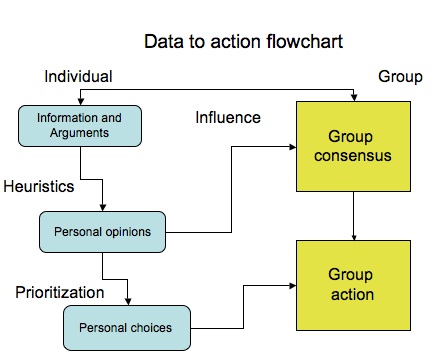One thing the thesis should definitely include is flowcharts. They make it easier to disentangle what is going on in complex relationships, both by clearly showing what phenomena are connected, and by suggesting the direction(s) in which causality runs. Here is one that I came up with, regarding the relationship between personal consensus (the position a person reaches after having thought a question through and reached an answer that satisfies them internally) and group consensus:

The starting point is the data presented to the individual. This consists both of empirically observed phenomena and of representations of truth made by others. There is an internal dynamic here. For instance, a person who has been reading a lot about global warming might be prejudiced towards interpreting an unusually hot summer in their part of the world as evidence for that trend. This is partly captured in the two-way arrow with group consensus, but it is also a matter of internal cognition.
Both empirical data and arguments (both logical and those based on other kinds of rationality) are transformed into personal opinions through the applications of heuristics. Examples of heuristic reasoning devices include:
- Conceptions about which individuals and groups provide trustworthy information
- Conceptions about what kind of evidence is strong or weak (for instance, opinions on the use of statistics or anecdotes)
- Particular facts that are so thoroughly believed that they become a touchstone against which other possibilities are rejected
This is not a comprehensive listing, but it gives an idea of the kind of mechanisms within a single person that are at work when forming opinions.
The link from personal opinions to personal choices is not a simple linear one. A second category of heuristics exist that do not determine what is considered true. Instead, they determine which opinions are important; specifically, they determine which opinions are important enough to deserve action.
Two major types of personal choices are represented in this model. Those in the box ‘personal choices’ could be called direct actions. This would include something like buying a hybrid car or boycotting a company. Within the arrow between personal opinions and group consensus lies the other kind of action: namely advocacy actions, in which an individual tries to convince other individuals or groups to adopt the same position the original individual has already reached. That feeds into the “information and arguments” boxes for other people, as well as contributing to the group phenomenon of consensus.
Group action is thus both the sum of personal choices, and the product of public deliberation leading to institutional or societal choices. Here again, a process of prioritization takes place.
An adapted version of this diagram could be constructed for scientists and for non-scientists. The biggest difference would be that scientists can engage in a broader project of empirical examination, thus contributing in a different way to the information and arguments being presented to others. They may well also employ different kinds of heuristics, when forming personal choices.



